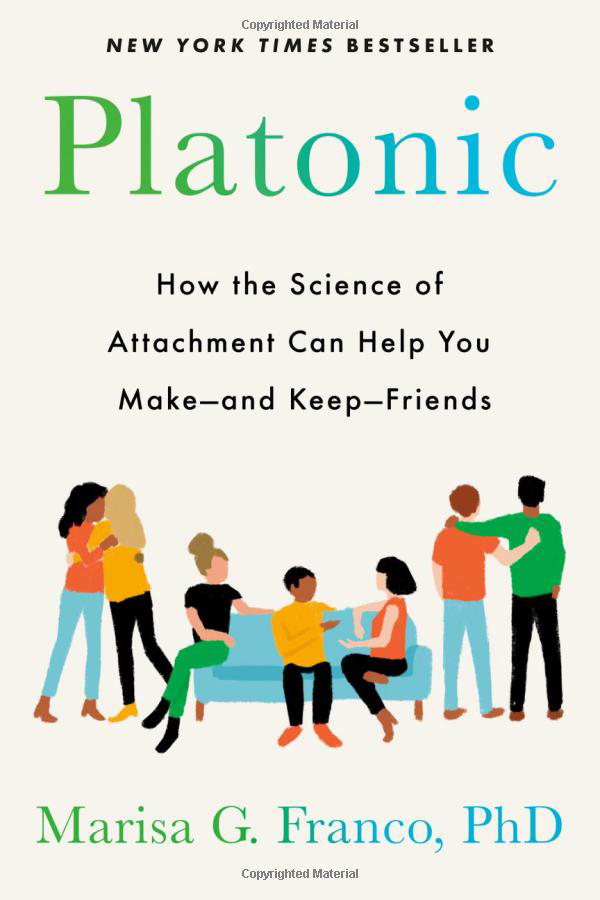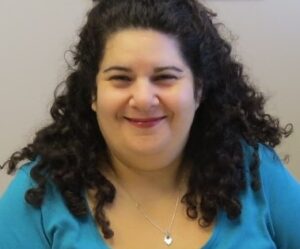Review By: Amy L. Kurlansky, Esq.

Welcome to the inaugural edition of the IWIL Catalyst book review! We’re hoping that this will become a feature of the IWIL Catalyst/Alert that you enjoy as much as we do. We plan to highlight books that have a wellness focus, providing you with even more tools on your own well-being journey.
Summer is the perfect time to kick back, hang in the hammock, sit by the pool, and enjoy the book review, “Reading Rainbow—style.”
Now that you’re relaxed and ready to channel your inner 10 year-old, let’s talk about the importance of connection in this isolating age, and what it takes to make and keep friends as an adult, as we highlight 2022’s Platonic: How the Science of Attachment Can Help You Make—and Keep—Friends, by Marisa G. Franco, PhD. Dr. Franco was one of IWIL’s featured speakers during 2023’s Well-Being Week in Law.
Earlier this year, the US Surgeon General published a report on the loneliness epidemic, which we will address in future IWIL publications. For now, the shortest nutshell of the report is that loneliness is both an individual and cultural problem with massive health implications.
Dr. Franco addresses these same concerns in Platonic, pointing out that loneliness has the same impact on your mortality rate as if you smoked fifteen cigarettes a day. And, research shows that regarding mental health concerns, out of 106 factors that can influence depression, the single strongest way to prevent depressive symptoms is to have someone to confide in.
Having strong friendships meets a number of the dimensions of well-being, including physical well-being, emotional well-being, and social well-being. Based on the suggestions for creating a solid network outlined in Platonic, good friendships are also part of the spiritual and occupational/intellectual well-being pillars.
Dr. Franco wrote Platonic during the 2020 lockdowns, when everyone was sheltering in place, and feeling isolated. There has been significant speculation that the COVID 19 pandemic jump started the loneliness epidemic. But, Dr. Franco points out that this problem may, in fact, pre-date the latest pandemic.
She points out, for example, Robert D. Putnam’s groundbreaking book, Bowling Alone, in which he theorized that our “increasing disengagement from civic life” contributes to our growing loneliness and sense of disconnection. Putnam also speculated that technology was another culprit—namely television.
That reliance on technology has only increased since Bowling Alone’s publication in 2000, contributing to isolation and loneliness.
In Platonic, Dr. Franco does a wonderful job of outlining her own research, as well as the research and conclusions of other heavy hitters in the wellness space. Many of those books are now on my “to-be-read” list.
Structurally, Dr. Franco begins Platonic with the scientific and social bases for why good friendships are important for our health, and the ways that modern society deemphasizes friendships, placing them on a lower pedestal than romantic relationships or familial relationships. But, she points out, it is in having solid friendships that we find our best health outcomes. Maybe it is because we choose our friends, whereas we don’t always choose our families, and maybe it is because even in the most loving of partnerships, sometimes you just need someone to vent to, someone who sees you and loves you and accepts you, even the broken parts.
As indicated in the book’s subtitle, Dr. Franco spends a significant amount of time discussing attachment theory—and how securely and insecurely attached people make or keep friendships.
Part one of Platonic explains the science behind how we are the way we are.
Then, part two provides 6 different strategies for how we can build strong networks of friends, and what that means moving forward.
Each chapter ends with some bite-sized takeaways from the chapter, to reinforce techniques and highlights from each chapter.
Just a few of her suggestions for stronger connections include being intentional in meeting people AND in following up, assuming people will like you (and will be interested in being your friend), and true authenticity and vulnerability.
In reading Platonic, my main take-aways are a sense of gratitude for the friendships that I have that have stood the test of time, and an openness for the ones that are yet to come. Thanks to Dr. Franco, I have a better understanding of the friendships in which I have room to grow as a friend, and why some friendships failed.
When we know better, we can do better. As Dr. Franco points out, we can create authentic friendships through our authenticity, which includes self-compassion: self-kindness, mindfulness, and common humanity.
Meaningful connection is what we are looking for in true friendships; Dr. Franco posits that “when we show affection to people, they invest right back.”
I want to take her tip, and show you my gratitude for investing your time in reading this review. I appreciate the chance to share some of my thoughts about Platonic with you, and I hope you get the chance to read it for yourself and improve your feelings of connection and community.

Amy L. Kurlansky, has served as the Reference Librarian at the Hamilton County Law Library since March 2018.
Prior to joining the Law Library, Ms. Kurlansky, worked as an Attorney at Pro Seniors, Inc., as a GAL for abused children in the foster care system, and as a Child Support Administrative Hearing Officer.
As a Staff Attorney for Pro Seniors, Inc., Ms. Kurlansky presented on the topics of Medicaid and Elder Abuse to community groups, social workers, and other attorneys. Ms. Kurlansky also collaborated on the 2014 OSBA Elder Law Handbook chapters on Medicaid and Elder Abuse.
Ms. Kurlansky belongs to the Ohio State Bar Association and the Cincinnati Bar Association. Ms. Kurlansky is a graduate of the CBA CALL (Cincinnati Academy of Leadership for Lawyers) Program. She serves as an appointed member of the CBA Admissions Committee, and as the Chair of the CBA Health and Well Being Committee. She also participates in the Legal Research & Information Resources Committee, the VOICE committee, Lawyers Connecting Beyond the Law, and is a former chair of CBA Elder Law Committee. Ms. Kurlansky is a member of the American Association of Law Librarians, the Ohio Regional Association of Law Librarians, and served as the immediate past chair of the Ohio Regional Association of Law Librarians County Law Library Special Interest Group. Ms. Kurlansky serves on the IWIL Catalyst committee.
